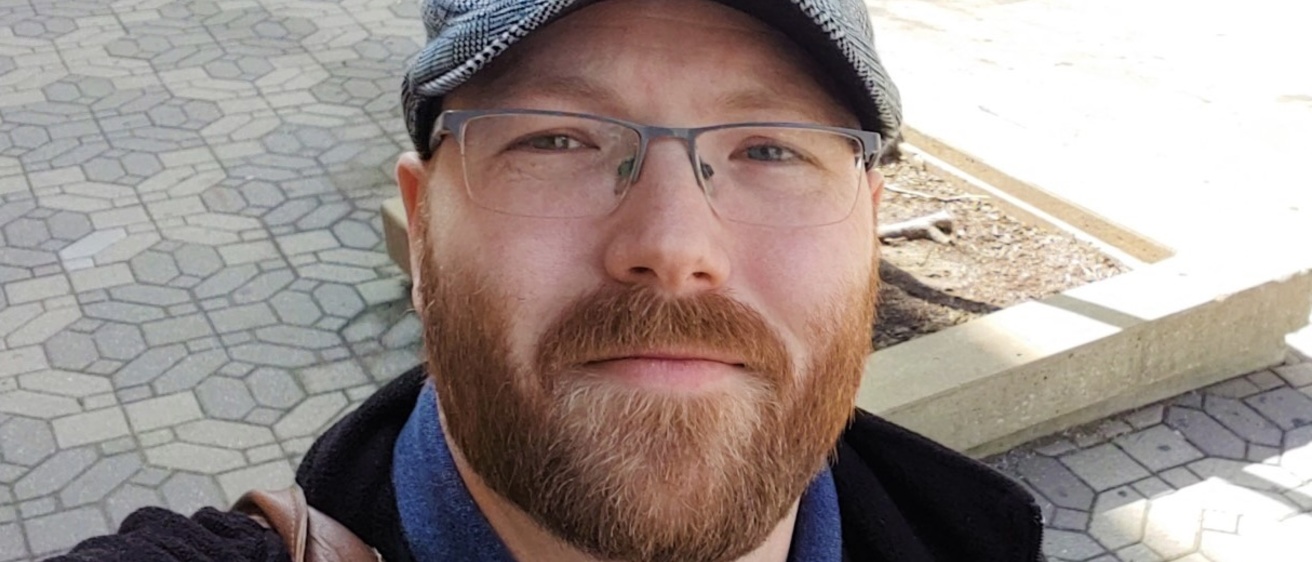After experiencing both homelessness and food security issues during his undergraduate education, Cole Denisen is now making a difference by studying these issues on college campuses.
Denisen, from Austin, Minnesota, is a doctoral student in the College of Education studying Higher Education and Student Affairs.
“I have had a bit of an unconventional path through higher education, or one that’s very common, depending on the point of view,” Denisen says.
He earned an associate in arts degree, a Bachelor of Arts degree, and a Master of Science degree by attending a total of four community colleges, two regional Master of Arts degree programs, and one Research I institution. Before enrolling as a doctoral student, Denisen worked in several roles including advising, admissions, residential life, and in a variety of institutions within higher education.
Denisen currently works at the College of Education’s Belin-Blank Center as part of the Bucksbaum Early Entrance Academy team while also working toward his degree. The academy empowers high-achieving students to begin full-time on-campus study at Iowa after their sophomore year of high school.
His experiences as an undergraduate student are what sparked his passion for college students’ basic needs and creating awareness of and addressing food security issues and homelessness on college campuses, which is ultimately what led him to pursue a doctoral degree.
“When I began my higher education career working at a small, rural-serving community college, it became very clear to me that I was among many students nationwide who experienced and are experiencing homelessness and issues of food access,” Denisen says. “I also found out how little information was available in the academic literature about how to best serve this student group.”
Denisen wanted to attend graduate school to gain a better understanding of the systemic factors that create and reproduce issues of access.
“I also wanted to engage with like-minded others to transform the system of higher education into something more accessible and equitable,” Denisen says.
When deciding where to attend graduate school, Denisen was drawn to Iowa by the opportunity to work with his advisor, Katharine Broton, an assistant professor in Higher Education and Student Affairs and one of the foremost scholars in the area of college student homelessness and food security issues.
“I came to the University of Iowa because I wanted to learn from the best,” Denisen says. “The University of Iowa is lucky to have numerous students, staff, and faculty committed to doing the work here in Hawkeye country, and it has been a privilege to be a part of that effort.”
Denisen is currently involved in several research projects. Most recently, he is looking into the history of low-income students on college campuses, at Iowa and elsewhere, as well as the form and function of campus pantries. Denisen is part of a research team that is studying the experiences of students who utilize the university’s food pantry.
Denisen is also researching the experiences of students attending the University of Iowa during the Great Depression, which involves archival research of more than 200 documents including students’ letters, journals, photographs, and university employment records.
Throughout his graduate school experience, Denisen says he has enjoyed being a part of the national conversation surrounding higher education finance and affordability.
“I have had the opportunity and privilege of meeting and engaging with numerous individuals, all of whom are dedicated to supporting students,” Denisen says. “I hope to continue to be a part of these efforts, and with some luck, find some solutions for creating more equitable educational outcomes.”
After completing his doctoral degree, Denisen also wants to continue teaching either at the graduate level or the undergraduate level, like he currently does as part of his position at the Belin-Blank Center.
“Much has been done, but more needs to be done to ensure higher education remains accessible to all,” Denisen says.
Denisen would like to point anyone interested in supporting the Food Pantry at Iowa to Sarah Henry in the Student Care and Assistance Office at sarah-henry@uiowa.edu. He would also encourage those interested in learning more about food security issues and homelessness among U.S. college students to check out the HOPE Center for Community and Justice at Temple University.
